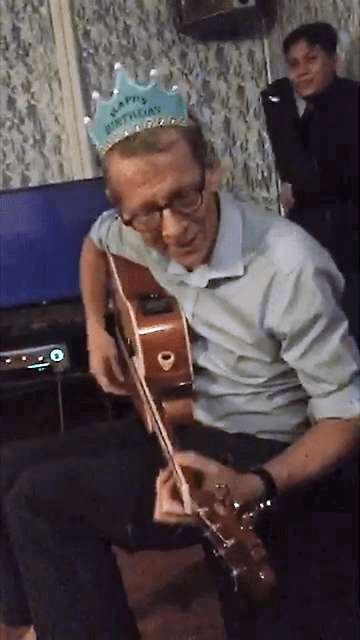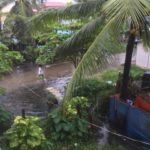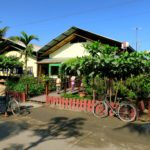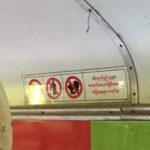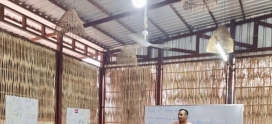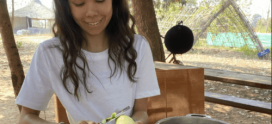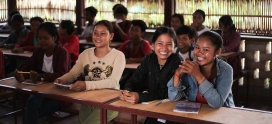Week 14/15
Trifle late with the blogs so you, whoever you poor souls might be, have three to catch up on as quickly as I can write them. So here I am back in Yangon, refreshed after a 6-week break summer back home being a retired but not too inactive pensioner, returned, reinvigorated and ready for action, a phrase I realise suggests a place in the six-nations team or serving in Afghanistan, neither of which have ever been in my grasp or indeed dreams and are certainly not pencilled in on my bucket list. But back in the thick of things in the clinics (picture) I am and thoroughly enjoying the challenges again.
On my 63rd birthday, as I slaved over NHS clinics and ward rounds complaining bitterly to all but secretly loving every minute of it, never in a year of complete improbabilities (Brexit and Trump the most obvious) would I have seen myself 12 months later singing a falsetto Barry Gibb impression at a Burmese karaoke bar fuelled by Myanmar beer which, as on exclusive offer, is a buy one get-one-free tempter. For those of you practiced in this art, then the Burmese variation adds a certain X-factor challenge – test your vocal cords to Abba sung by a tribute band in Burmese. Still, no respectable man of my tender years cannot move on without a rendition of ‘When I’m 64’ by the Beatles, which I duly did guitar in hand (picture). Not that the wonderful twenty’s Burmese doctors have ever heard of the famous Liverpudlians or indeed Liverpool and not that was it in any way a recognisable representation of the song.
Now it doesn’t affect my life one iota and certainly not the wonder work of the clinics and their staff or the whole MAM organisation in Yangon or elsewhere, but to not to at least mention what is happening in the Rakhine state now would be remiss and a disservice to the hundreds of thousands suffering unimaginable hardships. So, I’ve been trying to fathom it all out just as many of you have and asking those who certainly know more than me the ‘why’ question. Why is there such hatred to the Rakhine Rohingya Muslim minority from a Buddhist country where the people are the most welcoming, generous, polite, engaging, humorous, gentle, and considerate I have ever come across? It’s totally contrary to what you’d expect, especially as since the 1990s the Rakhine state has become one of the poorest and most isolated parts of a very poor and isolated country and you would think it would be the focus of national support and aid. It certainly doesn’t figure in the Lonely Planet guide as a destination ‘not to be missed’ for obvious reasons. Why is it the Rohingya minority are fearing for their lives and being forcibly removed to neighbouring Bangladesh refugee camps and Why has Aung San Suu Kyi not intervened? Indeed, why is this tragedy happening in the first place and how come as history has taught us, people can lose their sense of humanity in serving their beliefs?
The answer (and I’m boxing above my weight here) may lie in fact that the hard-line military approach is in line with the current view of most of the population as resurgent nationalism is gaining ground which, for Aung San Suu Kyi, may tie her hands and still her voice, together with the fact that the military control the army, not her – in both senses. It seems that to many, the threat from the Arakan Rohingya Salvation Army and their alleged atrocities against Buddhist minorities in Rakhine and the threat from Islamic extremists with both al-Qaeda and ISIS calling for ‘action’ in Myanmar is underpinning this passionate current Nationalism. It’s a mess and I certainly don’t pretend to understand it but as is always, the British and their colonial and military ambitions played their part. It was through the Rakhine district that Britain invaded Burma in 1842 following which they encouraged the ‘hard-working’ Bengali Muslims to follow.
But enough of this; I must move on to lighter subjects starting with the weather. The last time I was here was monsoon season and travelling without an umbrella expecting not to get wet equated to walking blindfold across one of Yangon’s many highways expecting not to be hit from both directions simultaneously or fall a foot down into a waterfilled pothole. Thankfully, the rains are receding but still without warning the Indian ocean may be deposited on one’s head for thirty minutes (picture). I have a vested interest in this as my family come to visit next week and I do want their time here to be memorable and not just because of the rain: still, some aspects of life here are beyond even my control. And, the clinic cat has had kittens (picture), the clinic dog is ageing and not as nifty when food is on offer or my foot is coming down, my diet has metamorphosed back to Burmese and consumption of beer increased, both to the concern of my wife.
All very interesting this I can hear you murmuring, but isn’t there meant to be just a touch of work-related business and an answer to the perennial questions: why am I here in the first place in the fascinating and beautiful country that Myanmar undoubtedly is, and most importantly what am I doing and what, if anything, I’ve achieved?
Well, as anyone who’s been where I am before and as the rest of you could have told me (or indeed did) before I even started, very little of what you sweat over, literally and metaphorically, takes root and changes clinic practice. But my raison d’etre for being here is education and thanks to a super-awesome hard-working acknowledged queen of karaoke volunteer working shoulder-to-shoulder with the senior organisation’s (MAM) staff, we have now rolled out a CME programme that is appreciated by the junior doctors.
Next week we start to roll-out guideline algorithms through weekly clinic sessions (no mean feat as 5 clinics) and I’m reintroducing 2-weekly more formal teaching sessions. But one-to-one teaching session is the yeast for a good sponge cake (and Myanmar beer), and allows you to pick up on minor changes that, if introduced, could make an enormous difference. So non-medics forgive me for a moment, but this week I realised that there were no appropriate diabetic diet sheets and no metformin for the type 2 diabetics. The latter must be bought at the chemist and costs the equivalent of 50 pence a month, a sum that is too much for most: result poor diabetic control if any. Both are worthwhile investments for the clinic and I’m sure to be actioned. Also, despite salbutamol inhalers being available, there are no Peak Flow Meters which are £8.75 on Amazon which would allow more objectivity in diagnosing airways obstruction. What am I saying? Simply that you don’t need 40 years doctoring experience to recognise where changes that could be made will take root and change practice.
And given that MAM is now looking at developing a smart phone App for use by their 1500 community health assistants in the remotest inaccessible areas of Myanmar, any of you, from GP to computer programmer, engineer to psychologist, can make an enormous difference. The benefits of two for the price of one gives added value, so couples are actively encouraged! However, there are local rules to adhere to such as on the trains (picture). You will always remember it, and as a doctor see so much: in the last three weeks we’ve had TB that is drug resistant, severe TB meningitis, cryptococcal meningitis, renal failure probably caused by a fruit they like here – more of that next time – and cerebral toxoplasmosis to mention just a handful.
Since I’m going to be putting pen to paper later this weekend for another of these I’m saving the rest for the next one. Till then
-Ed

